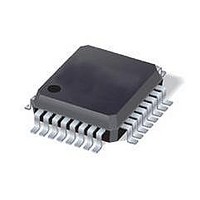ST7FLITE49K2T6 STMicroelectronics, ST7FLITE49K2T6 Datasheet - Page 156

ST7FLITE49K2T6
Manufacturer Part Number
ST7FLITE49K2T6
Description
IC MCU 8BIT 8K FLASH 32LQFP
Manufacturer
STMicroelectronics
Series
ST7r
Datasheet
1.ST7FLITE49K2T6TR.pdf
(245 pages)
Specifications of ST7FLITE49K2T6
Core Processor
ST7
Core Size
8-Bit
Speed
8MHz
Connectivity
I²C, SPI
Peripherals
LVD, POR, PWM, WDT
Number Of I /o
24
Program Memory Size
8KB (8K x 8)
Program Memory Type
FLASH
Eeprom Size
256 x 8
Ram Size
384 x 8
Voltage - Supply (vcc/vdd)
2.4 V ~ 5.5 V
Data Converters
A/D 10x10b
Oscillator Type
Internal
Operating Temperature
-40°C ~ 85°C
Package / Case
32-LQFP
Processor Series
ST7FLITE4x
Core
ST7
Data Bus Width
8 bit
Data Ram Size
384 B
Interface Type
I2C, SPI
Maximum Clock Frequency
8 MHz
Number Of Programmable I/os
24
Number Of Timers
4
Maximum Operating Temperature
+ 85 C
Mounting Style
SMD/SMT
Development Tools By Supplier
ST7FLITE-SK/RAIS, ST7FLI49M-D/RAIS, STX-RLINK
Minimum Operating Temperature
- 40 C
On-chip Adc
10 bit, 10 Channel
For Use With
497-8399 - BOARD EVAL ST7LITE49M/STLED316S497-5858 - EVAL BOARD PLAYBACK ST7FLITE
Lead Free Status / RoHS Status
Lead free / RoHS Compliant
Available stocks
Company
Part Number
Manufacturer
Quantity
Price
Company:
Part Number:
ST7FLITE49K2T6
Manufacturer:
ST
Quantity:
3 000
Company:
Part Number:
ST7FLITE49K2T6
Manufacturer:
STMicroelectronics
Quantity:
10 000
Company:
Part Number:
ST7FLITE49K2T6TR
Manufacturer:
STMicroelectronics
Quantity:
10 000
- Current page: 156 of 245
- Download datasheet (4Mb)
On-chip peripherals
11.6
11.6.1
11.6.2
Note:
11.6.3
156/245
Serial peripheral interface (SPI)
Introduction
The Serial Peripheral Interface (SPI) allows full-duplex, synchronous, serial communication
with external devices. An SPI system may consist of a master and one or more slaves or a
system in which devices may be either masters or slaves.
Main features
●
●
●
●
●
●
●
●
●
In slave mode, continuous transmission is not possible at maximum frequency due to the
software overhead for clearing status flags and to initiate the next transmission sequence.
General description
Figure 73 on page 157
three registers:
●
●
●
The SPI is connected to external devices through four pins:
●
●
●
●
Full duplex synchronous transfers (on three lines)
Simplex synchronous transfers (on two lines)
Master or slave operation
6 master mode frequencies (f
f
SS Management by software or hardware
Programmable clock polarity and phase
End of transfer interrupt flag
Write collision, Master mode fault and overrun flags
SPI control register (SPICR)
SPI control/status register (SPICSR)
SPI data register (SPIDR)
MISO: Master in / slave out data
MOSI: Master out / slave In data
SCK: Serial clock out by SPI masters and input by SPI slaves
SS: Slave select: This input signal acts as a ‘chip select’ to let the SPI master
communicate with slaves individually and to avoid contention on the data lines. Slave
SS inputs can be driven by standard I/O ports on the master Device.
CPU
/2 max. slave mode frequency (see note)
shows the serial peripheral interface (SPI) block diagram. There are
CPU
/4 max.)
ST7LITE49K2
Related parts for ST7FLITE49K2T6
Image
Part Number
Description
Manufacturer
Datasheet
Request
R

Part Number:
Description:
KIT STARTER RAISONANCE ST7FLITE
Manufacturer:
STMicroelectronics
Datasheet:

Part Number:
Description:
STMicroelectronics [RIPPLE-CARRY BINARY COUNTER/DIVIDERS]
Manufacturer:
STMicroelectronics
Datasheet:

Part Number:
Description:
STMicroelectronics [LIQUID-CRYSTAL DISPLAY DRIVERS]
Manufacturer:
STMicroelectronics
Datasheet:

Part Number:
Description:
BOARD EVAL FOR MEMS SENSORS
Manufacturer:
STMicroelectronics
Datasheet:

Part Number:
Description:
NPN TRANSISTOR POWER MODULE
Manufacturer:
STMicroelectronics
Datasheet:

Part Number:
Description:
TURBOSWITCH ULTRA-FAST HIGH VOLTAGE DIODE
Manufacturer:
STMicroelectronics
Datasheet:

Part Number:
Description:
Manufacturer:
STMicroelectronics
Datasheet:

Part Number:
Description:
DIODE / SCR MODULE
Manufacturer:
STMicroelectronics
Datasheet:

Part Number:
Description:
DIODE / SCR MODULE
Manufacturer:
STMicroelectronics
Datasheet:

Part Number:
Description:
Search -----> STE16N100
Manufacturer:
STMicroelectronics
Datasheet:

Part Number:
Description:
Search ---> STE53NA50
Manufacturer:
STMicroelectronics
Datasheet:

Part Number:
Description:
NPN Transistor Power Module
Manufacturer:
STMicroelectronics
Datasheet:











